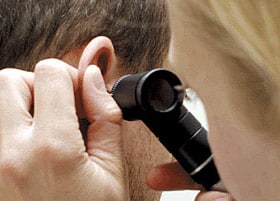Several Factors Can Impact The Life Of Hearing Aid Batteries
 For hearing aid users, as well as their families and friends, it can be a highly frustrating experience if the device loses power/fails at an inopportune time, especially when it occurs somewhere outside of the home. A social gathering, family wedding, or backyard barbecue can become a much less enjoyable occasion for all parties involved when someone’s batteries stop working unexpectedly.
For hearing aid users, as well as their families and friends, it can be a highly frustrating experience if the device loses power/fails at an inopportune time, especially when it occurs somewhere outside of the home. A social gathering, family wedding, or backyard barbecue can become a much less enjoyable occasion for all parties involved when someone’s batteries stop working unexpectedly.
Folks that use hearing aids are well aware that their batteries need to be reliable and operating at optimal levels in order to provide top quality performance and sound control. They are likely also aware that a device can lose power very quickly, so it is always a good idea to have an extra set of batteries on hand, either at home or away.
While it is often difficult to predict how long a battery will last, there are a few factors than can and will affect its longevity. These situations include:
- The amount of amplification
- The specific type of hearing aid
- The size of the batteries
- The amount of hearing aid use
- Overall battery quality
- Exposure to extreme temperatures
In addition, there are several signs or indicators that the batteries will soon need to be replaced. The most common of these signs would be:
- When there is a lack of clarity/distortion of sound
- When there is a repeated need to adjust the volume
- When warning beeps are heard (for aids with such an alarm)
- When sounds have essentially ‘disappeared’ altogether
The batteries in your hearing aids may last as little as a few days or as long as two to three weeks, depending on usage patterns and the degree of hearing loss. Hearing aid users would be well advised to track their specific battery usage rate or replacement rate over time to assess their individual circumstances and be better prepared for/anticipate when they will likely need to change their batteries.
How To Get The Most From Your Hearing Aid Batteries
Although the price of hearing aid batteries is relatively inexpensive compared to the actual devices themselves, the money spent on batteries over time will add to a substantial amount – and since hearing aids operate on battery power, this is an inevitable yet necessary expense.
While it is difficult to predict exact how long a battery might last, there are steps that can be taken to preserve and/or extend battery life and therefore make the money spent on batteries stretch just a little bit further.
The following suggestions or recommendations can be applied to hearing aid batteries that are currently in use and/or new batteries in your personal inventory:
- Keep batteries away from all metal objects (coins, keys, etc.)
- Leave new batteries sealed in their original packages
- A battery begins to discharge as soon as the seal is broken
- Turn hearing aids off when it is not in use
- Open the battery doors as well to prevent moisture build-up
- Remove batteries entirely if hearing aids will not be used for an extended period
- Store batteries at room temperature (cool and dry)
- Refrigeration is not required and may actually be detrimental to battery life
- Do not carry loose batteries in purses, wallets, pockets, etc.
- Batteries should be handled only after thorough hand-washing
- Dirt/body oils may affect the batteries and/or damage the hearing aid
If you are experiencing issues with your hearing aids, or looking for accessories available for your listening device, you may wish to obtain a professional opinion from a hearing aid specialist at Bravo Hearing Centre.
To troubleshoot and/or repair any problems pertaining to your hearing aids, call the specialists at Bravo Hearing Centre today at 416-207-9711 for an expert opinion on/attention to your specific hearing needs.


